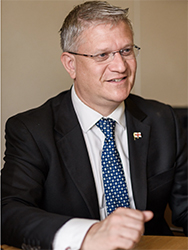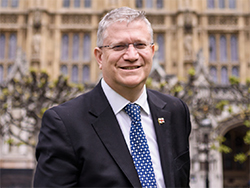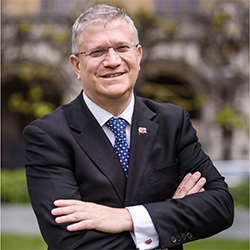 As Chairman of the UK’s All-Party Parliamentary Group for the Channel Islands, Andrew Rosindell MP is a fierce defender of the islands’ right to self-govern. But he is keen for them to remain firmly within the ‘British family’
As Chairman of the UK’s All-Party Parliamentary Group for the Channel Islands, Andrew Rosindell MP is a fierce defender of the islands’ right to self-govern. But he is keen for them to remain firmly within the ‘British family’
What’s your background and how did you get to where you are now?
I took a great interest in national issues, even at school. I was also active in my local community. So, for me, getting involved in politics was doing two things I was very passionate about: my local community and national politics. That’s how I got involved with my local Conservative Party and that’s really the beginning of what has seemed like a conveyor belt into becoming an MP.
How did you come to be involved with the All-Party Parliamentary Group for the Channel Islands?
I’ve always been extremely interested in and passionate about the Channel Islands. The first time I ever left England was to go to Jersey on a family holiday. It was 1976 and I was 10 years old. I’d never been anywhere else. In those days, no one really understood, and people today don’t even understand, that Jersey’s not part of the UK.
That trip had a big impact on me because I fell in love with the Channel Islands. I went to Guernsey two years later. My sister worked in Guernsey, so I got to learn a lot about the Channel Islands. Since then, I’ve been back many, many times – for personal visits and, since becoming an MP, for All-Party Group visits and bilateral visits, meeting the different chief ministers of Jersey and Guernsey over many years.
And then nine years ago I became Chairman of the All-Party Group that deals with the Channel Islands.
In a nutshell, what does the All-Party Group for the Channel Islands do?
It exists to open dialogue about, and cooperation on, issues between parliamentarians in the UK and the Channel Islands. The UK Parliament, ultimately, is the sovereign parliament for all territories and dependencies.
We do have the power here in the UK Parliament to make laws and decisions that have an effect on places such as the Channel Islands but there’s no representation here to have a say over those decisions. So there needs to be some kind of dialogue – particularly when the UK or the EU or whoever might be doing something that could have a detrimental effect on the Channel Islands.
The chief ministers and the governments of the Channel Islands can come here and, through MPs who are members of the Group, can fight against or promote issues, or call for change to areas that aren’t working as well as they should. So that’s its primary role. But it’s also there to promote friendship and cooperation between our parliaments, peoples and governments.
 You proposed, back in 2012, that the Crown Dependencies should be represented in the UK Parliament. Is this still something you would like to see?
You proposed, back in 2012, that the Crown Dependencies should be represented in the UK Parliament. Is this still something you would like to see?
Let’s be clear about this. What I do not believe is that the UK Parliament should have any way of interfering with the running of the Crown Dependencies. Crown Dependencies are separate; they’re not part of the UK and they’re not going to become part of the UK.
I would not support anything that would take away the right of the Channel Islands to be completely self-governing and to have the kind of arrangements that they choose to have with the UK.
What I also don’t agree with is that we make decisions in the UK Parliament on a whole range of things – defence, foreign policy, international treaties, environmental issues, currency – that directly affect the Channel Islands and the Crown Dependencies. When it comes to those issues, there should be a voice for them in Parliament. We should be a parliament of all British peoples, not just the UK.
But in no way would I ever support anything that would take away the right of the Channel Islands to make their own decisions in their own interests. This would be giving them an extra voice, not taking anything away from them.
Would you go so far as to say the islands should be independent of the UK?
That’s a matter for the people of the Channels Islands to decide but, personally, I would not like to see that happen because they are British and I believe that the British family needs to stand together.
How do you see the current relationship between the UK and the Channel Islands?
It has been good for a very long time but there are issues that come up – currently in terms of beneficial ownership – which are regrettable. For me, it’s a constitutional matter.
I don’t think we should have the right to impose things on Jersey and Guernsey that are essentially domestic matters for Jersey and Guernsey to decide on. We are overreaching our powers by doing that. Issues like that, I’m afraid, are causing a lot of harm to the relationship.
What are your thoughts about the recent decision taken by the governments of the Crown Dependencies to publish public registers of beneficial ownership by 2023?
I respect the decision, but it is deeply regrettable that they have been pressured into this by Westminster. I understand why the authorities need to know – to clamp down on criminality, money laundering and other illegal practices. But I do not understand why these things have to be put into the public domain – which inevitably means that people will invest in other places where they can do so without being put in front of the media and members of the public.
Losing investment would be detrimental to the territory concerned, but also to the UK because so much of the investments that come through the Channel Islands come via the City of London and the UK benefits from that. So we would potentially lose a lot of income.
I think it would also lead to all kinds of other unintended consequences if people’s personal wealth was revealed. People with that wealth would be put in a position where they would feel unsafe, for example.
There are so many things going on here that worry me. So, yes, although there does need to be a register, it should be available only to the authorities and the people who need to see it to ensure that crime is not taking place.
You’re a strong supporter of the UK’s decision to leave the EU. How do you think Brexit will affect the UK’s relationship with the Channel Islands, if at all?
I think it’s going to improve the relationship, because the Channel Islands and the UK will need to put a lot more effort into direct bilateral relationships between the governments of the other European nations.
When it comes to UK trade with Europe, I don’t believe for one moment that suddenly we’re not going to be able to trade and sell our goods to Europe any more than they will not be able to sell their goods to us. But because Britain will be an independent trading nation again, we can set our own tariffs, our own ambitions in terms of our trade policy and our own trade deals around the world.
Britain is the most important market for the Channel Islands, so the investment and trade that we will generate as a result of having an independent trade policy will have, I think, a very positive knock-on effect on the Crown Dependencies.
A lot of the businesses we speak to in the Channel Islands are mindful of Brexit and want the UK to come out well from the negotiations, but they’re also stepping up efforts to strengthen ties around the world. Does that concern you in any way?
Not at all. I think it’s a very positive thing. The only thing I would say is that because the Channel Islands have no effective voice here, I don’t think UK governments of any political persuasion have actually represented the interests of the Channel Islands in the way they should have.
So, inevitably, it will be the case that the Crown Dependencies will want to build up their own international profile and make their own international relations.
That’s a positive thing, provided it’s consistent with the UK. They are still under the UK’s wing – and I believe that will continue – so I want to strengthen that UK/Crown Dependencies relationship, give the Crown Dependencies a stronger voice and a greater say, but also encourage them to do their own thing and build their international profile – because they are different.
 Guernsey and Jersey market themselves as very separate jurisdictions. Is there any merit in them building a more integrated Channel Islands brand to project to the outside world?
Guernsey and Jersey market themselves as very separate jurisdictions. Is there any merit in them building a more integrated Channel Islands brand to project to the outside world?
I wouldn’t like to say to Jersey and Guernsey: “You’ve got to be working together”. I can see an advantage in them having their own brands because they are very different places with different identities and their own specialities. I think their strength is that they are so different.
But in a global context, they are of course very small. So I can also see the advantage of them working together, but it should be by cooperation. They don’t have to merge into one block; they can still be separate, but cooperate where it’s sensible to do so. But this is very much a matter for them.
Historically, there’s been a bit of rivalry between Jersey and Guernsey – I understand that. But they are working together and I think that’s a good thing, provided they don’t – and I don’t think they will – lose their identity, because they cherish that very strongly.
Looking ahead, what are the goals that you would like to achieve on behalf of the Channel Islands?
We should allow the Crown Dependencies to be represented in areas where they’re not at the moment. To give an example, Jersey and Guernsey are not members of the Commonwealth. They’re not nation states, so they can’t be full members of the Commonwealth.
But I’ve argued there should be a special status for territories and dependencies within the Commonwealth. There are actually 31 territories and dependencies – mostly of the UK, but of Australia and New Zealand as well – which have no status in the Commonwealth. We should be fighting harder to give them a status, whether it’s associate membership or territory status or whatever you want to call it.
Also, there are actions we can take here in the UK. For instance, we have a national service on Remembrance Sunday to which all members of the Commonwealth are invited to lay wreaths. But we still don’t invite a representative of Jersey, Guernsey, the Isle of Man or even Alderney and Sark to come and lay their own wreath at the Cenotaph. Things like that are symbolically very important and I think that we, the UK, needs to offer those opportunities.
One victory we have had is the flying of the flags for the four Channel Islands from Parliament Square. That only happened when I fought to make that a reality at the time of the Queen’s Diamond Jubilee.
In the end, the government decided the flags of all the territories and dependencies would also be flown for the Queen’s birthday every year and for state visits. That is hugely important educationally because you can say to people that those are the flags of the Channel Islands and they’re part of the British family.
And I know when Channel Islands representatives are over here and they see their flags flying, they’re very proud to see it, and I’m pleased to have had a role in making sure that happened. So at least now we’re winning some of the symbolic battles.
FACT FILE
Name: Andrew Rosindell
Age: 53
Position: MP for Romford and Chairman of the All-Party Paliamentary Group for the Channel Islands
Home town: Romford, Essex
Studied at: Marshalls Park School, Romford
First job: Commercial estate agent in Mayfair, London
Hobbies: History, heritage, travel and dogs
Did you know: As a result of Andrew’s campaigning efforts, the Union Jack is now flown from the UK Houses of Parliament all year round. This wasn’t the case prior to 2010.